- Home
- Frank Herbert
Hunters Of Dune Page 2
Hunters Of Dune Read online
Page 2
Ensconced in the archives now, young Miles reviewed surveillance records from Gammu's spaceport security, images taken from tall Guild Bank buildings in the city. Each step of the assault made perfect sense to him, even as he studied the records many years later. It was the only way to succeed, and we accomplished it. . . .
After flying to Rakis, Teg and his men had found Reverend Mother Odrade and Sheeana riding a giant old worm to meet the no-ship out in the great desert. Time was short. The vengeful Honored Matres would be coming, apoplectic because the Bashar had made fools of them on Gammu. On Rakis, he and his surviving men departed the no-ship with armored vehicles and extra weapons. Time for one last, but vital, engagement.
Before the Bashar led his loyal soldiers out to face the whores, Odrade casually but expertly scratched the skin of his leathery neck, not-so-subtly collecting cell samples. Both Teg and the Reverend Mother understood it was the Sisterhood's last chance to preserve one of the greatest military minds since the Scattering. They realized he was about to die. Miles Teg's final battle.
By the time the Bashar and his men clashed with Honored Matres on the ground, other groups of the whores were swiftly taking over the Rakian population centers. They slew the Bene Gesserit Sisters who remained behind in Keen. They killed the Tleilaxu Masters and the Priests of the Divided God.
The battle was already lost, but Teg and his troops hurled themselves against the enemy defenses with unparalleled violence. Since Honored Matre hubris would not allow them to accept such humiliation, the whores retaliated against the whole world, destroying everything and everyone there. Including him.
In the meantime, the old Bashar's fighters had created a diversion so the no-ship could escape, carrying Odrade, the Duncan ghola, and Sheeana, who had tempted the ancient sandworm into the vessel's cavernous cargo hold. Soon after the ship flew to safety, Rakis was destroyed--and that worm became the last of its kind.
That had been Teg's first life. His real memories ended there.
WATCHING IMAGES OF the final bombardment now, Miles Teg wondered at what point his original body had been obliterated. Did it really matter? Now that he was alive again, he had a second chance.
Using the cells Odrade had taken from his neck, the Sisterhood grew a copy of their Bashar and triggered his genetic memories. The Bene Gesserit knew they would require his tactical genius in the war with the Honored Matres. And the boy Teg had indeed led the Sisterhood to its victory on Gammu and Junction. He had done everything they asked of him.
Later, he and Duncan, along with Sheeana and her dissidents, had stolen the no-ship yet again and fled from Chapterhouse, unable to bear what Murbella was allowing to happen to the Bene Gesserit. Better than anyone else, the escapees understood about the mysterious Enemy that continued to hunt for them, no matter how lost the no-ship might be. . . .
Weary with facts and forced memories, Teg switched off the records, stretched his thin arms, and left the archives sector. He would spend several hours in vigorous physical training, then work on his weapons skills.
Though he lived in the body of a thirteen-year-old, it was his job to remain ready for everything, and never lower his guard.
Why ask a man who is already lost to lead you? Why then are you surprised if he leads you nowhere?
--DUNCAN IDAHO,
A Thousand Lives
T
hey were adrift. They were safe. They were lost.
An unidentifiable ship in an unidentifiable universe.
Alone on the navigation bridge, as he often was, Duncan Idaho knew that powerful enemies were still after them. Threats within threats within threats. The no-ship wandered the frigid void, far from any recorded human exploration. A different universe entirely. He couldn't decide whether they were hiding or trapped. He wouldn't have known how to get back to a familiar star system, even if he'd wanted to.
According to the bridge's independent chronometers, they had been in this strange, distorted otherwhere for years . . . though who could say how time flowed in another universe? The laws of physics and the landscape of the galaxy might be completely altered here.
Abruptly, as if his concerns had been laced with prescience, he noticed the main instrument panel blinking erratically, while the stabilizing engines surged up and down. Though he couldn't see anything more unusual than the now-familiar twistings of gases and distorted energy ripples, the no-ship had encountered what he'd come to think of as a "rough patch." How could they encounter turbulence in space when nothing was there?
The ship shook in a whiplash of strange gravity, jarred by a spray of high-energy particles. When Duncan switched off the automatic piloting systems and altered course, the situation worsened. Barely perceptible flashes of orange light appeared in front of the vessel, like a faint, flickering fire. He felt the deck shudder, as if he had rammed into some obstacle, but he could see nothing. Nothing at all! It should have been an empty vacuum, giving them no sensation of movement or turbulence. Strange universe.
Duncan corrected course until the instruments and engines smoothed out, and the flashes disappeared. If the danger grew any worse, he might be forced to attempt yet another risky foldspace jump. Upon leaving Chapterhouse, he had flown the no-ship without guidance, having purged all navigation systems and coordinate files, using nothing but his intuition and rudimentary prescience. Each time he activated the Holtzman engines, Duncan gambled with the whole ship, and the lives of the 150 refugees aboard. He wouldn't do it unless he had to.
Three years ago, he'd had no choice. Duncan had lifted the great craft from its landing field--not escaping per se, but stealing the entire prison where the Sisterhood had put him. And simply flying away wasn't sufficient. In his attuned mind, he had seen the trap closing around them. The Outside Enemy observers, in their bizarrely innocuous guises of an old man and an old woman, had a net they could cast across vast distances to entangle the no-ship. He'd seen the sparkling multicolored mesh begin to contract, and the strange old couple smiling with victory. They had thought he and the no-ship were in their grasp.
His fingers a blur, his concentration sharp as a diamond chip, Duncan had made the Holtzman engines do things that not even a Guild Navigator would ask of them. As the Enemy's invisible web ensnared the no-ship, Duncan had flung them away, flying the enormous vessel so deeply into the folds of space that he tore the fabric of the universe itself and slid beyond. His ancient Swordmaster training had come to his aid. Like a slow blade slipping through an otherwise impenetrable body shield.
And the no-ship had found itself somewhere else entirely. But he had remained vigilant, not allowing himself to breathe a sigh of relief. In this incomprehensible universe, what might be next?
Now he studied external images transmitted from sensors extended beyond the no-field. The view outside had not changed: twisted veils of nebula gas, inside-out streamers that would never condense into stars. Was this a young universe, not yet finished coalescing, or a universe so unspeakably ancient that all suns had burned out and been reduced to molecular ash?
The group of misfit refugees desperately wanted to get back to normal . . . or at the very least to somewhere else. Over such a long time, their fear and anxiety had faded first to confusion, then to restlessness and malaise. They wanted more than simply being lost and unharmed. Either they looked to Duncan Idaho with hope, or they blamed him for their plight.
The ship contained a hodgepodge of humanity's factions (or did Sheeana and her Bene Gesserit Sisters view them all as mere "specimens?"). The assortment included a sprinkling of orthodox Bene Gesserits--acolytes, proctors, Reverend Mothers, even male workers--along with Duncan himself and the young Miles Teg ghola. Also aboard were a Rabbi and his group of Jews who had been rescued from an attempted Honored Matre pogrom on Gammu; one surviving Tleilaxu Master; and four animalistic Futars--monstrous human-feline hybrids created out in the Scattering and enslaved by the whores. In addition, the great hold was home to seven small sandworms.
T
ruly, we are a strange mixture. A ship of fools.
A year after escaping from Chapterhouse and becoming mired in this distorted and incomprehensible universe, Sheeana and her Bene Gesserit followers had joined Duncan in a christening ceremony. In light of the no-ship's endless wanderings, the name Ithaca seemed appropriate.
Ithaca, a small island in ancient Greece, had been the home of Odysseus, who had spent ten years wandering after the end of the Trojan War, trying to find his way back home. Similarly, Duncan and his companions needed a place to call home, a safe haven. These people were on their own great odyssey, and without so much as a map or a star chart, Duncan was as lost as age-old Odysseus.
No one realized how much Duncan longed to go back to Chapterhouse. Heartstrings linked him to Murbella, his love, his slave, and his master. Breaking free of her had been the single most difficult and painful endeavor he could remember in his multiple lifetimes. He doubted he would ever entirely recover from her. Murbella . . .
Yet Duncan Idaho had always placed duty above personal feelings. Regardless of the heartache, he assumed responsibility for keeping the no-ship and its passengers safe, even in a skewed universe.
At odd times, stray combinations of odors reminded him of Murbella's distinctive scent. Organic esters that drifted through the no-ship's processed air would strike his olfactory receptors, triggering memories from their eleven years together. Murbella's perspiration, her dark amber hair, the particular taste of her lips, and the seawater scent of their "sexual collisions." Their passionate, codependent encounters had been both intimate and violent for years, with neither of them strong enough to break free.
I must not confuse mutual addiction with love. The pain was at least as sharp and unendurable as the debilitating agony of drug withdrawal. Hour by hour as the no-ship flew through the void, Duncan drew farther from her.
He leaned back and opened his unique senses, reaching out, always wary that someone might find the no-ship. The danger in letting himself do this passive sentry duty was that he occasionally descended into muddled woolgathering about Murbella. To get around the problem, Duncan compartmentalized his Mentat mind. If a portion of it drifted, another portion was always alert, always on the lookout for danger.
In their years together, he and Murbella had produced four daughters. The oldest two--twins--would be nearly grown now. But from the moment the Agony had transformed his Murbella into a true Bene Gesserit, she had been lost to him. Because an Honored Matre had never before completed training--actually, retraining--to become a Bene Gesserit Reverend Mother, the Sisterhood had been exceptionally pleased with her. Duncan's shattered heart had been, and still was, merely collateral damage.
In his mind's eye, Murbella's lovely countenance haunted him. His Mentat abilities--both a skill and a curse--allowed him to call up every detail of her features: her oval face and wide brow, the hard green eyes that reminded him of jade, the willowy body that could fight and make love with equal prowess. Then he remembered that her green eyes had become blue after the spice Agony. Not the same person . . .
His thoughts wandered, and Murbella's features shifted in his mind. Like an afterimage burned onto his retinas, another woman began to take shape, and he was startled. This was an outside presence, a mind immeasurably superior to his own, searching for him, wrapping gentle strands around the Ithaca.
Duncan Idaho, a voice called, soothing and feminine.
He felt a rush of emotions, as well as an awareness of danger. Why hadn't his Mentat sentry system seen this coming? His compartmentalized mind snapped into full survival mode. He jumped toward the Holtzman controls, intending once again to fling the no-ship far away, without guidance.
The voice tried to intercede. Duncan Idaho, do not flee. I am not your enemy.
The old man and woman had made similar assurances. Though he had no idea who they were, Duncan did comprehend that they were the real danger. But this new muliebral presence, this vast intellect, had touched him from outside of the strange, unidentified universe that the no-ship currently inhabited. He struggled to get away but could not escape the voice.
I am the Oracle of Time.
In several of his lives, Duncan had heard of the Oracle--the guiding force of the Spacing Guild. Benevolent and all-seeing, the Oracle of Time was said to be a shepherding presence that had watched over the Guild since its formation fifteen thousand years ago. Duncan had always considered it an odd manifestation of religion among the hyperacute Navigators.
"The Oracle is a myth." His fingers hovered over the touchpads of the command console.
I am many things. He was surprised when the voice did not contradict his accusation. Many seek you. You will be found here.
"I trust in my own abilities." Duncan powered up the foldspace engines. From her external point of view, he hoped the Oracle wouldn't notice what he was doing. He would take the no-ship somewhere else, fleeing again. How many different powers were hunting them?
The future demands your presence. You have a role to play in Kralizec.
Kralizec . . . typhoon struggle . . . the long-foretold battle at the end of the universe that would forever change the shape of the future.
"Another myth," Duncan said, even as he activated the foldspace jump without warning the other passengers. He couldn't risk staying here. The no-ship lurched, then plunged once more into the unknown.
He heard the voice fading as the ship escaped the Oracle's clutches, but she did not seem dismayed. Here, the distant voice said, I will guide you. The intruding voice faded, ripping away like shreds of cotton.
The Ithaca careened through foldspace and, after an interminably brief instant, tumbled out again.
Stars shone all around the ship. Real stars. Duncan studied the sensors, checked the navigation grid, and saw the sparkles of suns and nebulae. Normal space again. Without further verification he knew that they had fallen back into their own universe. He couldn't decide whether to rejoice or cry out in despair.
Duncan no longer sensed the Oracle of Time, nor could he detect any of the likely searchers--the mysterious Enemy and the unified Sisterhood--though they must still be out there. They would not have given up, not even after three years.
The no-ship continued to run.
The strongest and most altruistic leader, even if his office is dependent on the support of the masses, must look first to the dictates of his heart, never allowing his decisions to be swayed by popular opinion. It is only through courage and strength of character that a true and memorable legacy is ever attained.
--from "Collected Sayings of Muad'Dib" by the
PRINCESS IRULAN
L
ike a dragon empress surveying her subjects, Murbella sat on a high throne in the large receiving hall of the Bene Gesserit Keep. Early morning sunlight poured through the tall stained-glass windows, splashing colors around the chamber.
Chapterhouse was the center of a most peculiar civil war. Reverend Mothers and Honored Matres came together with all the finesse of colliding spacecraft. Murbella--following Odrade's grand plan--allowed them no other option. Chapterhouse was home to both groups now.
Each faction hated Murbella for the changes she had imposed, and neither had the strength to defy her. Through their union, the conflicting philosophies and societies of the Honored Matres and the Bene Gesserits merged like horrific Siamese twins. The very concept was appalling to many of them. The potential for reigniting bloodshed always hung in the air, and the forced alliance teetered on the edge of failure.
That was a gamble some in the Sisterhood had not been willing to accept. "Survival at the cost of destroying ourselves is no survival at all," Sheeana had said just before she and Duncan took the no-ship and flew away. "Voting with their feet," as the old saying went. Oh, Duncan! Was it possible that Mother Superior Odrade had not guessed what Sheeana planned to do?
Of course I knew, said the voice of Odrade from Other Memory. Sheeana hid it from me for a long time, but in the end I knew.
>
"And you chose not to warn me of it?" Murbella often sparred aloud with the voice of her predecessor, one of the many ancestral inner voices she could access since becoming a Reverend Mother.
I chose to warn no one. Sheeana made her decisions for her own reasons.
"And now we must both live with the consequences."
From her throne, Murbella watched the guards lead in a female prisoner. Another disciplinary matter for her to handle. Another example she must make. Though such demonstrations appalled the Bene Gesserits, the Honored Matres appreciated their value.
This situation was more important than others, so Murbella would handle it personally. She smoothed her shimmering black-and-gold robe across her lap. Unlike the Bene Gesserits, who understood their places and required no ostentatious symbols of rank, Honored Matres demanded gaudy signs of status, like extravagant thrones or chairdogs, ornate capes in vivid colors. Thus, the self-proclaimed Mother Commander was forced to sit on an imposing throne encrusted with soo-stones and firegems.
Enough to purchase a major planet, she thought, if there were any I wanted to buy.
Murbella had come to hate the trappings of office, but she knew the necessity. Women in the different costumes of the two orders attended her constantly, alert for any sign of weakness in her. Though they underwent training in the ways of the Sisterhood, Honored Matres clung to their traditional garments, serpent-scribed capes and scarves, and formfitting leotard bodysuits. By contrast, the Bene Gesserits shunned bright colors and covered themselves with dark, loose robes. The disparity was as clear as that between gaudy peacocks and camouflaged bush wrens.
The prisoner, an Honored Matre named Annine, had short blond hair and wore a canary yellow leotard with a flamboyant cape of sapphire plazsilk moire. Electronic restraints kept her arms folded across her midsection, as if she wore an invisible straitjacket; a nerve-deadening gag muzzled her mouth. Annine struggled ineffectively against the restraints, and her attempts to speak came out as unintelligible grunts.

 Direct Descent
Direct Descent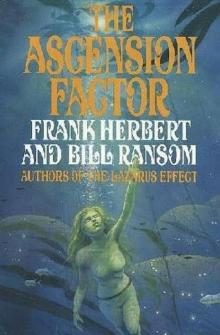 The Ascension Factor
The Ascension Factor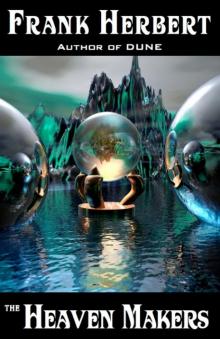 The Heaven Makers
The Heaven Makers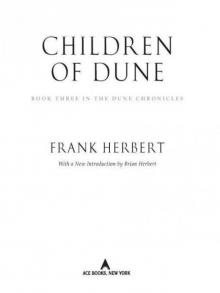 Children of Dune
Children of Dune Old Rambling House
Old Rambling House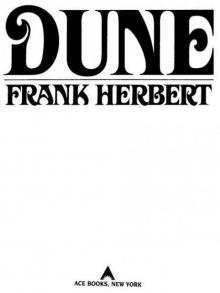 Dune
Dune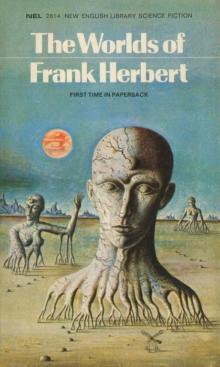 The Worlds of Frank Herbert
The Worlds of Frank Herbert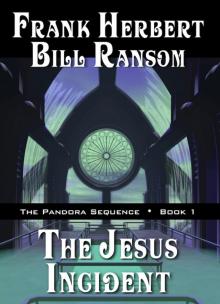 The Jesus Incident
The Jesus Incident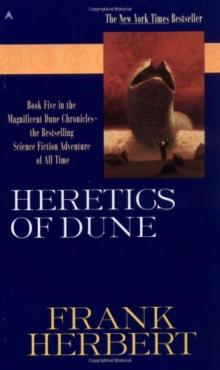 Heretics of Dune
Heretics of Dune Whipping Star
Whipping Star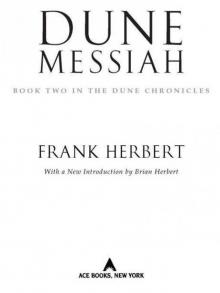 Dune Messiah
Dune Messiah Man of Two Worlds
Man of Two Worlds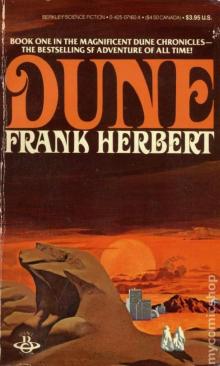 The Book of Frank Herbert
The Book of Frank Herbert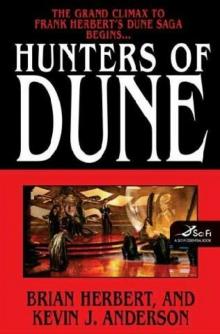 Hunters Of Dune
Hunters Of Dune The Tactful Saboteur
The Tactful Saboteur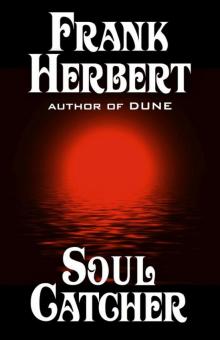 Soul Catcher
Soul Catcher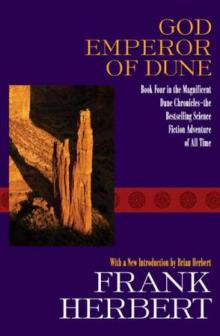 God Emperor of Dune
God Emperor of Dune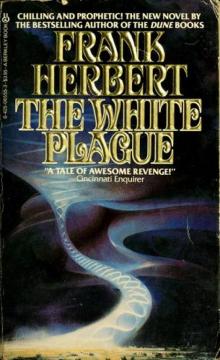 The White Plague
The White Plague The Green Brain
The Green Brain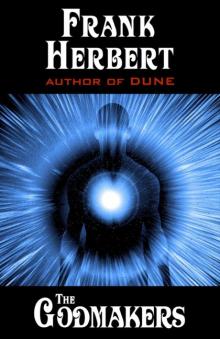 The Godmakers
The Godmakers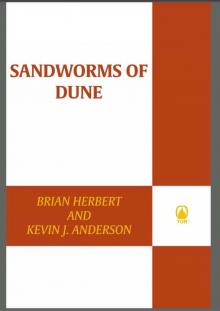 Sandworms of Dune
Sandworms of Dune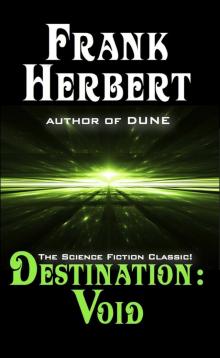 Destination Void
Destination Void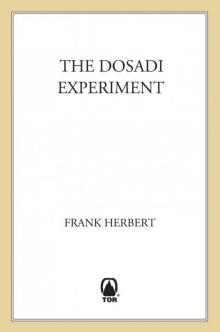 The Dosadi Experiment
The Dosadi Experiment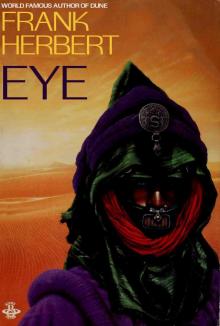 Eye
Eye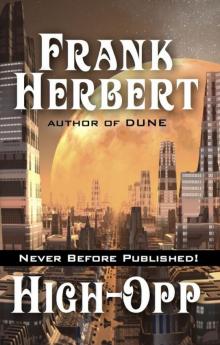 High-Opp
High-Opp The Eyes of Heisenberg
The Eyes of Heisenberg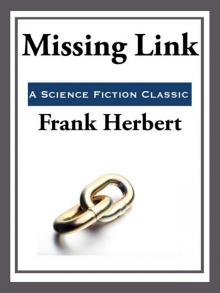 Missing Link
Missing Link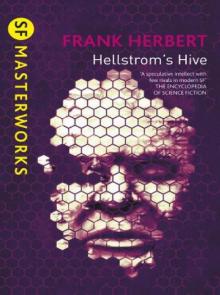 Hellstrom's Hive
Hellstrom's Hive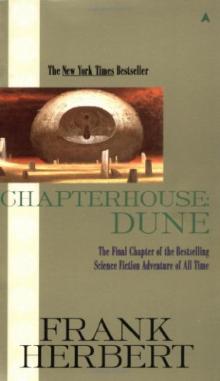 Chapterhouse: Dune
Chapterhouse: Dune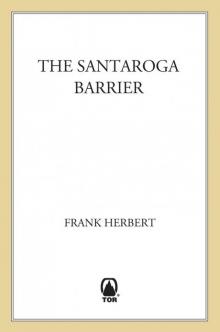 The Santaroga Barrier
The Santaroga Barrier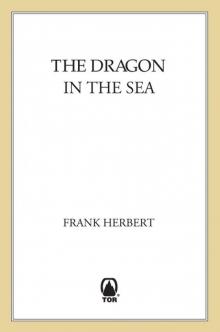 The Dragon in the Sea
The Dragon in the Sea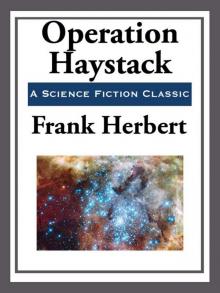 Operation Haystack
Operation Haystack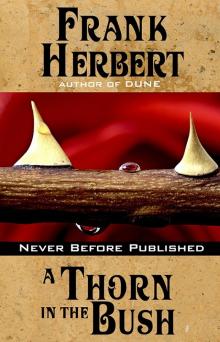 A Thorn in the Bush
A Thorn in the Bush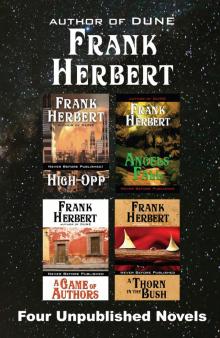 Four Unpublished Novels
Four Unpublished Novels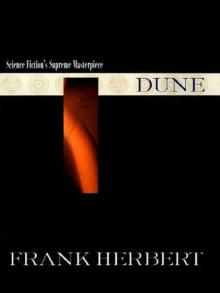 Dune dc-1
Dune dc-1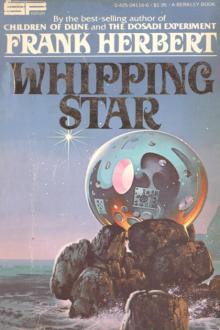 Jorj X. McKie 1 - Whipping Star
Jorj X. McKie 1 - Whipping Star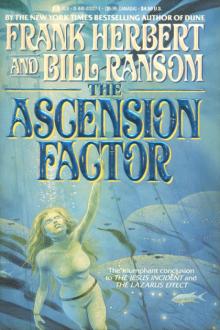 DV 4 - The Ascension Factor
DV 4 - The Ascension Factor Frank Herbert - Dune Book 4 - God Emperor Of Dune
Frank Herbert - Dune Book 4 - God Emperor Of Dune ChapterHouse: Dune dc-6
ChapterHouse: Dune dc-6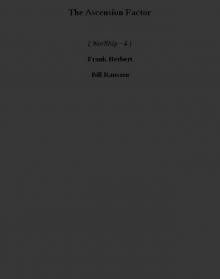 The Ascension Factor w-4
The Ascension Factor w-4 A Game of Authors
A Game of Authors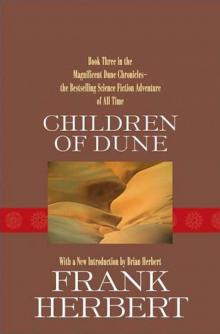 Children of Dune dc-3
Children of Dune dc-3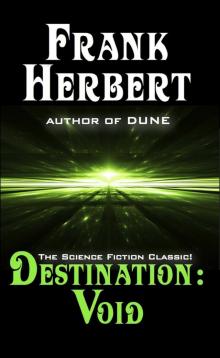 Destination: Void: Prequel to the Pandora Sequence
Destination: Void: Prequel to the Pandora Sequence The Collected Stories of Frank Herbert
The Collected Stories of Frank Herbert Dune Messiah dc-2
Dune Messiah dc-2 Frank Herbert - Dune Book 5 - Heretics of Dune
Frank Herbert - Dune Book 5 - Heretics of Dune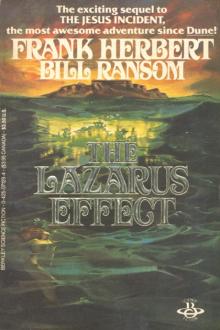 DV 3 - The Lazarus Effect
DV 3 - The Lazarus Effect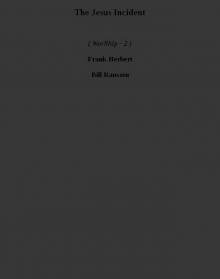 The Jesus Incident w-2
The Jesus Incident w-2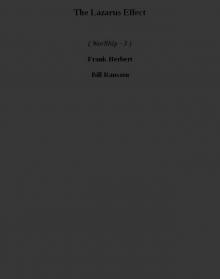 The Lazarus Effect w-3
The Lazarus Effect w-3 Frank Herbert
Frank Herbert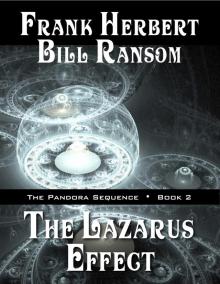 The Ascension Factor: Pandora Sequence
The Ascension Factor: Pandora Sequence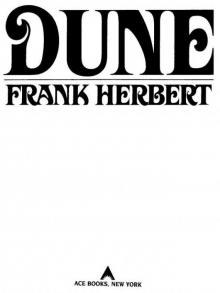 Dune (40th Anniversary Edition)
Dune (40th Anniversary Edition)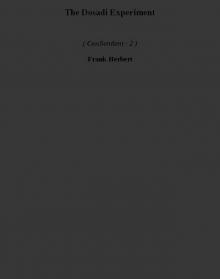 The Dosadi Experiment c-2
The Dosadi Experiment c-2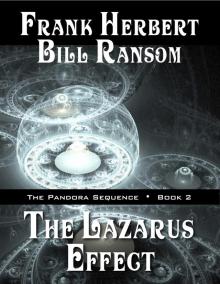 The Lazarus Effect
The Lazarus Effect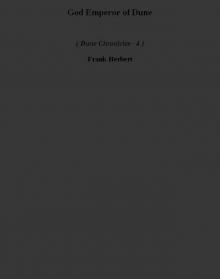 God Emperor of Dune dc-4
God Emperor of Dune dc-4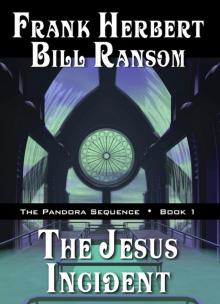 The Pandora Sequence: The Jesus Incident, the Lazarus Effect, the Ascension Factor
The Pandora Sequence: The Jesus Incident, the Lazarus Effect, the Ascension Factor The Green Brain (v4.0)
The Green Brain (v4.0) The Heaven Makers (v4.0)
The Heaven Makers (v4.0)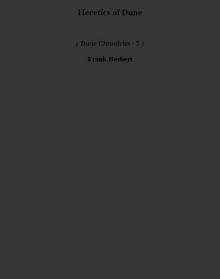 Heretics of Dune dc-5
Heretics of Dune dc-5